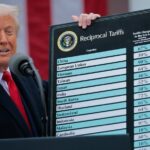US President Donald Trump has confirmed that Washington will engage in direct talks with Iran this Saturday, aiming to strike a new nuclear agreement amid escalating tensions in the Middle East.
The announcement followed a White House meeting with Israeli Prime Minister Benjamin Netanyahu, during which Trump said the talks would take place at a “very high level”. The discussions mark a significant shift in US-Iran relations, particularly after Trump’s decision to withdraw from the 2015 nuclear deal during his first term in office.
“We have a very big meeting on Saturday, and we’re dealing with them directly,” Trump told reporters in the Oval Office. “Maybe a deal is going to be made—that would be great.” However, he warned that failure to reach an agreement could have severe consequences for Tehran. “Iran cannot have a nuclear weapon, and if the talks aren’t successful, I actually think it’ll be a very bad day for Iran.”
The talks have been confirmed by Iran’s Foreign Minister Abbas Araqchi, who said the discussions would be held in Oman on 12 April. Araqchi described the meeting as “as much an opportunity as it is a test”, adding that “the ball is in America’s court”.
Tensions between the two countries have remained high for years. Last month, Trump threatened military action after Iran’s Supreme Leader Ayatollah Ali Khamenei rejected an earlier offer for direct negotiations. The president had sent a letter via the UAE, signalling his willingness to resume talks, but it was declined.
Iran’s nuclear programme has long been a concern for the international community. The 2015 Joint Comprehensive Plan of Action (JCPOA), brokered by the Obama administration and co-signed by China, France, Germany, Russia, and the UK, aimed to limit Iran’s nuclear activity in exchange for sanctions relief. But the deal began to unravel after Trump’s withdrawal in 2018, which led to Iran gradually breaching its commitments and enriching uranium beyond permitted levels.
The International Atomic Energy Agency (IAEA) has since raised alarm over Iran’s growing stockpile of enriched uranium, warning of its potential use in nuclear weapons development.
During the meeting at the White House, Netanyahu echoed Trump’s hardline stance, stating: “We and the United States are both united in the goal that Iran does not ever get nuclear weapons. If it can be done diplomatically in a full way, the way it was done in Libya, I think that would be a good thing.”
Israel has reportedly considered striking Iranian nuclear facilities in recent months and previously carried out attacks in response to Iranian missile strikes.
While hopes for diplomacy remain, Trump’s remarks underline the stakes involved. “Iran would be in great danger if the talks fail,” he said, leaving little doubt that the US is prepared to act should negotiations collapse.
The world now turns to Oman, where a new chapter in US-Iran relations could begin—or tensions could spiral further out of control.







